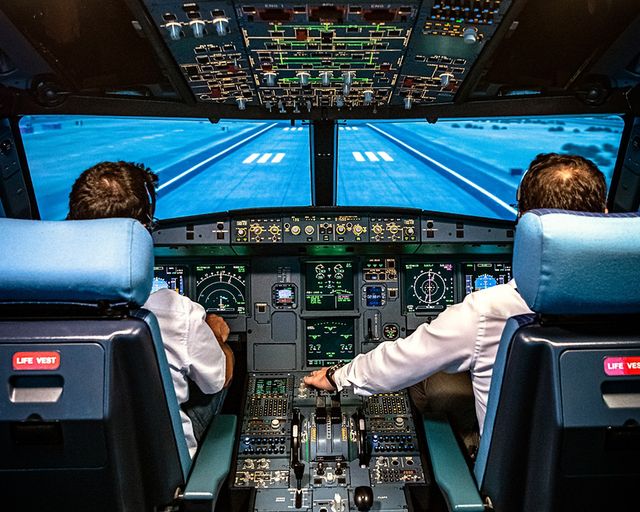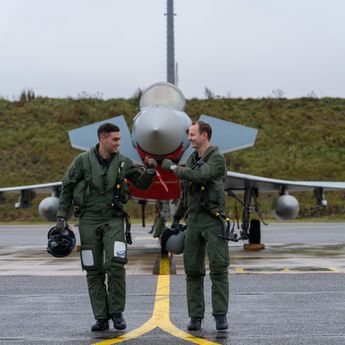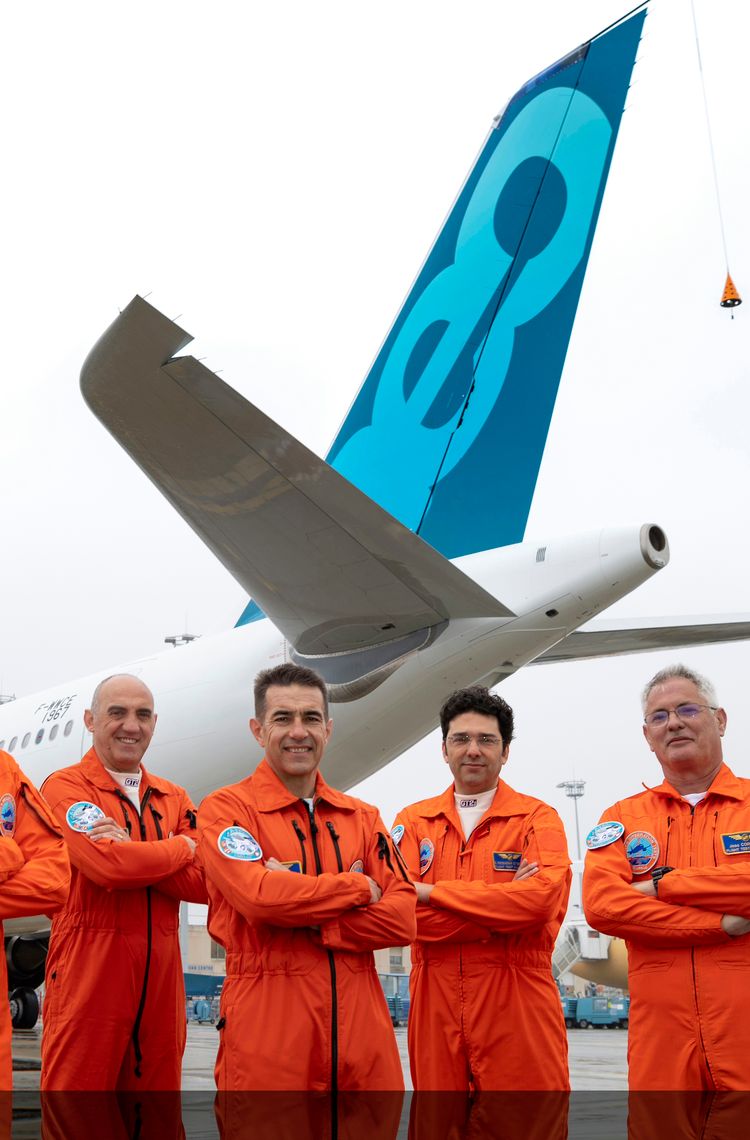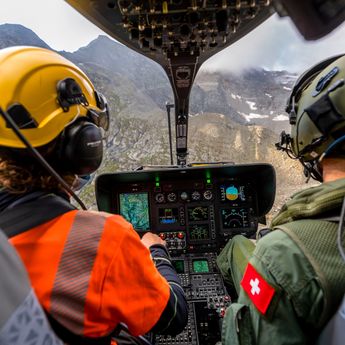Piloting across the globe with Airbus
Whether testing a new aircraft, flying people safely around the world or providing emergency relief, we support the pilots who fly our products to further Airbus' mission of pioneering sustainable aerospace for a safe and united world.
Join us in celebrating and get an inside look at what it is like to be, or to become, a pilot.
-

2023 World Pilot's Day
Have you ever wondered what it is really like to be a pilot ? At Airbus, it’s an incredibly varied experience where no two days or no two flights are the same. Whether they’re operating their mission on a commercial aircraft, a helicopter or a military aircraft, our pilots get the chance to see the world from a unique perspective. So fasten your seat belts and let’s get going !
-

World Pilots' Day 2024
Airbus helicopter pilots from around the world
-

30 years Eurofighter - Flight Display (16:9 format)

Have you ever wondered what it's really like to be a pilot?
In focus
At Airbus, flight missions are incredibly varied and the job has many responsibilities. Whether they're at the controls of a commercial or military aircraft, or a helicopter, pilots have the chance to see the world from a unique point of view.
So fasten your seatbelts and let's go!
What it's like to be part of a Flight Test team
You asked, we answered
Why the orange flight suits? And does a Test Pilot get nervous before a first flight?
Read the answers here!
What do you test in a test aircraft?
"When testing an aircraft we test all what needs to be tested to ensure that the aircraft can safely carry passengers. That includes all the systems of the plane, so everything that allows it to fly and to ensure passenger comfort. That's why there are not only pilots on board the aircraft, but also flight test and test flight engineers." Jean-Philippe Cottet, Head of Airbus Flight Test
Do you get nervous when flying a new aircraft for the first time?
"I wouldn’t say I get nervous flying a new aircraft for the first time, rather excited. Before we do a first flight, in my case it was the A321XLR, we are preparing for 3 or 4 months in simulators, analysing all the possible emergencies, all failure cases. So when we do the first flight the whole team is very well prepared." Gabriel Diaz De Villegas Giron, Experimental Test Pilot
What is the role of a flight test engineer during a test flight?
"During a test flight the Flight Test Engineer conducts the flight. This means that he manages the sequence of test points in order to be the most efficient possible in a single flight." Jean-Philippe Cottet, Head of Airbus Flight Test
What is the best part of your job?
"The best part of my job.. obviously it’s flying, that’s what we do almost every day. But I would say that the nice thing of my job is the team that we have. Without the Flight test Engineers we can’t do any tests, without the ground test engineer and all the people who are preparing the aircraft we’re not able to do any tests – we need to work as a team. So I would say, obviously flying, but in a team." Gabriel Diaz De Villegas Giron, Experimental Test Pilot
Why is the flight suit orange?
"People keep asking me why the orange flight suit. I must say that it’s mainly a tradition. In the old days people were wearing orange suits in order to be found easily. Nowadays, we wear the suit because it's easy to wear and it’s also protecting us against fire. In addition – it’s pretty cool!" Jean-Philippe Cottet, Head of Airbus Flight Test
Where was your most remote Flight Test Campaign?
"In Flight Test we do different campaigns to perform certification flights. For some certification flights we have to go to areas very hot, others areas very cold. I would say that the most remote part of the world we’ve been in is in Daocheng Airport, close to Tibet. We went there with the A320 to perform a high altitude campaign. It was pretty high – elevation was more than 14000 feet (+4200 metre), and we had to perform some take-offs, landings and touch-and-goes during which and we even had to use oxygen." Gabriel Diaz De Villegas Giron, Experimental Test Pilot
What is your favourite aircraft programme?
You asked, we answered
Pilots in action
In the spotlight
-

Stories Helicopters
Queen of the Skies
As a flight test engineer and three-time world gliding champion, Anne Ducarouge is determined to inspire the next generation of women pilots and engineers. Learn more about what encouraged her to… -

Stories Defence
Stronger together: Spanish and German Eurofighters secure Baltic skies
-

Stories Helicopters
H225 ICG pilots keep their cool after volcanic eruption
-

Stories Defence
The A400M: A force for global security and humanitarian aid

Training the pilots of tomorrow
You asked, we answered
Ever wondered what it takes to become a commercial airline pilot? Or to train one? We asked flight instructor Mikaël Merrien, former fighter pilot, who is now Chief Theoretical Knowledge Instructor and Flight & IRI pilot Instructor at Airbus Flight Academy Europe, and has over 4800 hours of flying experience.
What level of pilots do you teach?
At Airbus Flight Academy, we train future commercial airline pilots. The Airbus Pilot Cadet Training programme is designed to allow someone with no flying experience to become ‘ready to fly’ pilots. Both individuals or airline cadets come from all over the world to be trained in our flight schools network, in France, in Mexico and more to come!
What's it like instructing future commercial pilots?
We train each cadet to be operationally-ready pilots, acting as an airline pilot. We focus not only on technical skills but also on developing non-technical competencies, such as leadership, teamwork and communication. We continuously monitor Knowledge, Skills and Attitude throughout their training path.
What's the best part of your job as an instructor pilot?
The success of our cadets! Seeing each of them evolve, acting as a team of experienced instructors to help them best develop to the level of competency necessary to start their journey as a commercial airline pilot. It's not only about teaching them and passing on experience but also about teaching them how to apply these competences as future aviation professionals.
How can I become a commercial pilot?
To join the Airbus Flight Academy you don’t need any specific background or previous flight experience. If you are passionate about aviation, over 18 years old, have a high school diploma (ideally including Maths) and have a good level of English, you can enrol in our programme that lasts approximately 20-24 months.
Read more about flight training
In the spotlight
Meet the Airbus Flight Test Team
You asked, we answered














